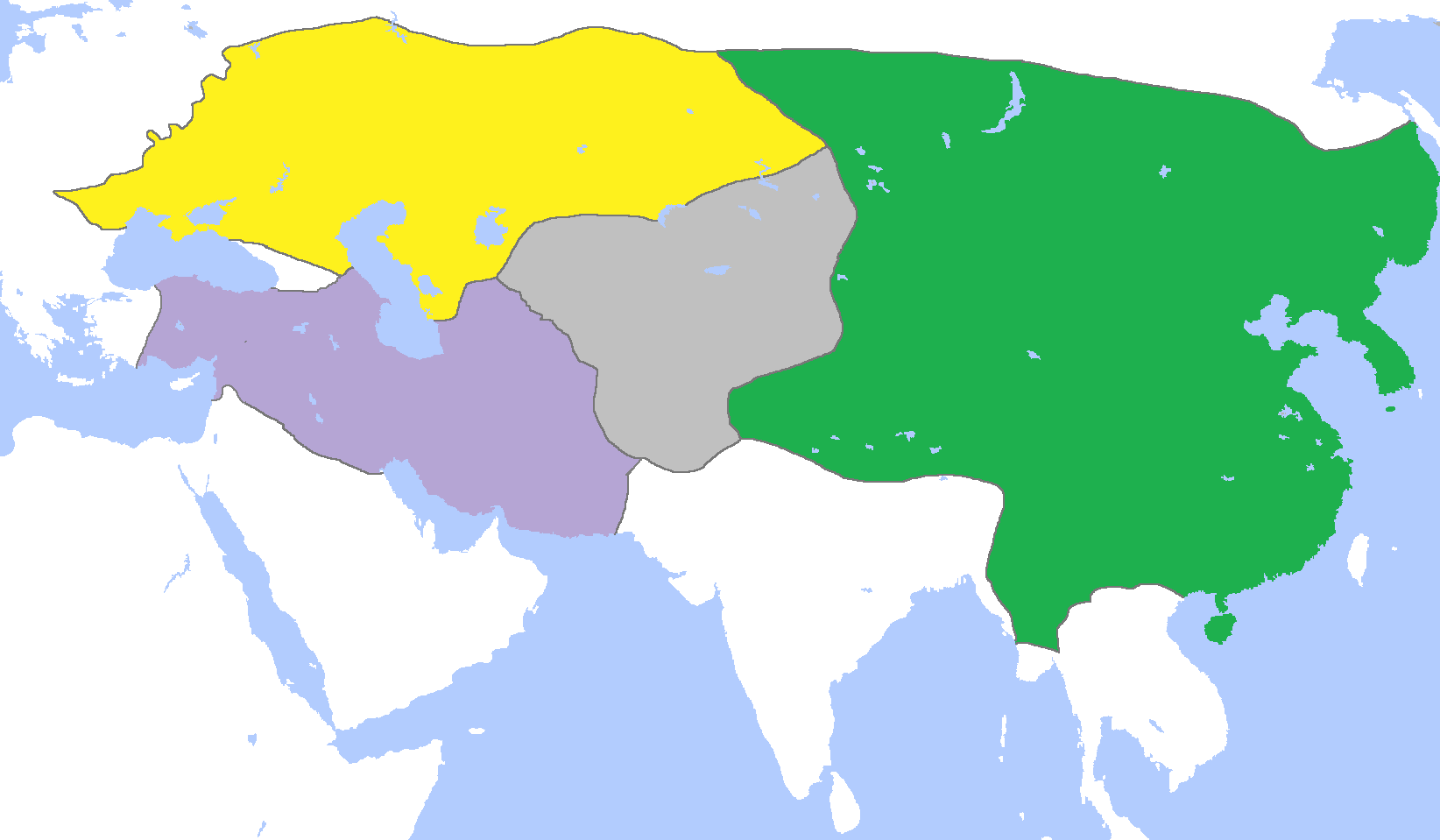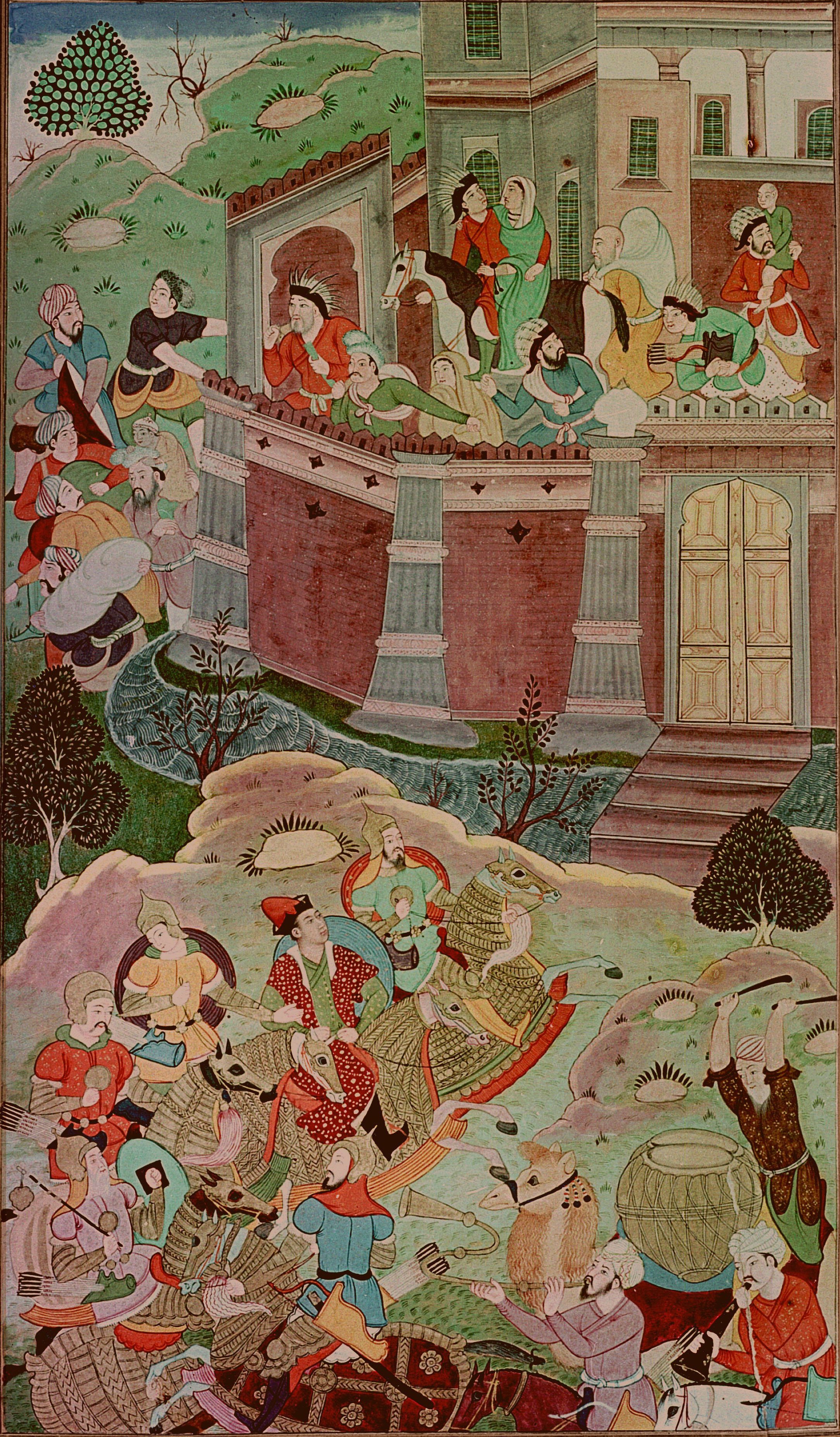|
Buqa Temür
Buqa Temür (Cyrillic Mongolian: , not to be confused with Tuka Timur, son of Djötchi, brother of Batu) was a khan of the Chagatai Khanate (1272?-1282). He was the son of Qadaqchi. Sometime around 1272 Buqa Temür killed Negübei, who had risen in revolt against Kaidu. Perhaps as a reward for this, Kaidu appointed him as head of the Chagatai Khanate. Soon after, he was stricken by illness, and the rest of his reign was marked by a failure to impose his authority. He was helpless against the raids of the sons of Alghu and Baraq, as well as forces of the Ilkhanate The Ilkhanate, also spelled Il-khanate ( fa, ایل خانان, ''Ilxānān''), known to the Mongols as ''Hülegü Ulus'' (, ''Qulug-un Ulus''), was a khanate established from the southwestern sector of the Mongol Empire. The Ilkhanid realm, .... In 1282 he was replaced by Duwa. Chagatai khans 13th-century monarchs in Asia Year of death unknown Year of birth unknown {{Noble-stub ... [...More Info...] [...Related Items...] OR: [Wikipedia] [Google] [Baidu] |
Chagatai Khanate
The Chagatai Khanate, or Chagatai Ulus ( xng, , translit=Čaɣatay-yin Ulus; mn, Цагаадайн улс, translit=Tsagaadain Uls; chg, , translit=Čağatāy Ulusi; fa, , translit=Xânât-e Joghatây) was a Mongol and later Turkicized khanate that comprised the lands ruled by Chagatai Khan, second son of Genghis Khan, and his descendants and successors. At its height in the late 13th century the khanate extended from the Amu Darya south of the Aral Sea to the Altai Mountains in the border of modern-day Mongolia and China, roughly corresponding to the area once ruled by the Qara Khitai (Western Liao dynasty). Initially, the rulers of the Chagatai Khanate recognized the supremacy of the Great Khan,Dai Matsui – A Mongolian Decree from the Chaghataid Khanate Discovered at Dunhuang. Aspects of Research into Central Asian Buddhism, 2008, pp. 159–178 but by the reign of Kublai Khan, Ghiyas-ud-din Baraq no longer obeyed the emperor's orders. During the mid-14th century, t ... [...More Info...] [...Related Items...] OR: [Wikipedia] [Google] [Baidu] |
Negübei
Negübei was a khan of the Chagatai Khanate (1271–1272?). He was the son of Sarban. In 1271 Negübei was appointed by Kaidu as head of the Chagatai Khanate. A year after his enthronement, however, he rebelled against his master, possibly in conjunction with the revolts launched by the sons of Alghu Alghu (d. 1265 or 1266) was a khan of the Chagatai Khanate (1260–1265/6). He was the son of Baidar and the grandson of Chagatai Khan. Biography In 1260 he was appointed as head of the ''ulus'' of the Chagatai Khanate by the Great Khan claimant ... and Baraq. Kaidu responded by sending an army against Negübei, and the latter was forced to flee to the east. Soon afterward, he was killed and subsequently replaced by Buqa Temür. 1272 deaths Chagatai khans 13th-century monarchs in Asia Year of birth unknown {{Asia-royal-stub ... [...More Info...] [...Related Items...] OR: [Wikipedia] [Google] [Baidu] |
Duwa
Duwa (; died 1307), also known as Du'a, was khan of the Chagatai Khanate (1282–1307). He was the second son of Baraq. He was the longest reigning monarch of the Chagatayid Khanate and accepted the nominal supremacy of the Yuan dynasty as Great Khan before his death. Under his rule, the Chagatai Khanate reached its peak. History In 1282, Kaidu appointed Duwa as head of the Chagatai Khanate, in an effort to gain peace between himself and the sons of Baraq, who had ravaged Central Asia for much of the past ten years. This promotion ensured the loyalty of the Chaghataids from that point to Kaidu's death. Several years earlier, in 1275, Duwa destroyed a force in Uyghuria loyal to Kublai Khan, led by the Chaghataid Ajiki and Kublai's son Ayachi. The following year, Kaidu and Duwa launched an expedition against Beshbalik, defeated the Yuan forces there and captured the city. The strike given by Kaidu and Duwa was so hard that Uyghurs lost Dzungaria. During the rule of 4th Gre ... [...More Info...] [...Related Items...] OR: [Wikipedia] [Google] [Baidu] |
Sunni Islam
Sunni Islam () is the largest branch of Islam, followed by 85–90% of the world's Muslims. Its name comes from the word ''Sunnah'', referring to the tradition of Muhammad. The differences between Sunni and Shia Muslims arose from a disagreement over the succession to Muhammad and subsequently acquired broader political significance, as well as theological and juridical dimensions. According to Sunni traditions, Muhammad left no successor and the participants of the Saqifah event appointed Abu Bakr as the next-in-line (the first caliph). This contrasts with the Shia view, which holds that Muhammad appointed his son-in-law and cousin Ali ibn Abi Talib as his successor. The adherents of Sunni Islam are referred to in Arabic as ("the people of the Sunnah and the community") or for short. In English, its doctrines and practices are sometimes called ''Sunnism'', while adherents are known as Sunni Muslims, Sunnis, Sunnites and Ahlus Sunnah. Sunni Islam is sometimes referr ... [...More Info...] [...Related Items...] OR: [Wikipedia] [Google] [Baidu] |
Kaidu
Kaidu (Middle Mongol: , Modern Mongol: / , ; ; c. 1230 – 1301) was a grandson of the Mongol khagan Ögedei (1185–1241) and thus leader of the House of Ögedei and the ''de facto'' khan of the Chagatai Khanate, a division of the Mongol Empire. He ruled parts of modern-day Xinjiang and Central Asia during the 13th century, and actively opposed his uncle, Kublai, who established the Yuan dynasty. Medieval chroniclers often mistranslated Kadan as Kaidu, mistakenly placing Kaidu at the Battle of Legnica. Kadan was the brother of Güyük, and Kaidu's uncle. Chambers, James. ''The Devil's Horsemen: The Mongol Invasion of Europe''. Atheneum. New York. 1979. Early life Kaidu was the son of Kashin (whose name is also spelled Qashi) Marco Polo and Rustichello of Pisa. ''The Travels of Marco Polo'', Volume 2, Book 4, Chapter 1. Edited and annotated by Henry Yule and revised by Henri Cordier, 3rd Ed. 1903. and therefore a grandson of Ögedei Khan and Töregene Khatun, and a gre ... [...More Info...] [...Related Items...] OR: [Wikipedia] [Google] [Baidu] |
Alghu
Alghu (d. 1265 or 1266) was a khan of the Chagatai Khanate (1260–1265/6). He was the son of Baidar and the grandson of Chagatai Khan. Biography In 1260 he was appointed as head of the ''ulus'' of the Chagatai Khanate by the Great Khan claimant Ariq Böke, in opposition to the child khan Mubarak Shah (Chagatai Khan), Mubarak Shah and his mother Orghana, marrying her. In 1261 he was sent to Central Asia, where he quickly established control of much of the Chagatai Khanate, as well as other areas, particularly those that were formerly under the control of the Blue Horde. He also seized control of Samarkand and Bukhara, which before had been ruled jointly between the Chagatai Khan and the Great Khan. Alghu supported Ariq Böke in the Toluid Civil War against Kublai Khan, but later deserted him. In 1262 he rebelled against Ariq Boke and commanded 150.000 soldiers against him; the conflict saw a series of violent clashes over the next two years. Alghu gained the support of the Great Kh ... [...More Info...] [...Related Items...] OR: [Wikipedia] [Google] [Baidu] |
Baraq (Chagatai Khan)
Baraq () was a khan of the Chagatai Khanate (1266–1271). He was the son of Yesünto'a and a great-grandson of Chagatai Khan. A convert to Islam, he took the name Ghiyas-ud-din. Background Baraq's family had moved to China following his father's exile by the Great Khan Möngke Khan for his support of the house of Ögedei Khan. Baraq grew up in the camp of Kublai Khan and gained distinction there. Early 1260s Sometime in the early 1260s he traveled to Central Asia and earned the trust of Mubarak Shah. When the latter was again enthroned as Chagatai Khan in 1266, Baraq gained support among the army for a coup and deposed Mubarak Shah in September of that year. Almost immediately, he repudiated the authority of Kublai as Great Khan. He removed Kublai's representative of Chinese Turkestan, replacing him with one of his own governors. His vastly superior army prevented Kublai's officers from expelling him, and Khotan was ravaged by his forces. Nevertheless, Kublai Khan sent him ... [...More Info...] [...Related Items...] OR: [Wikipedia] [Google] [Baidu] |
Ilkhanate
The Ilkhanate, also spelled Il-khanate ( fa, ایل خانان, ''Ilxānān''), known to the Mongols as ''Hülegü Ulus'' (, ''Qulug-un Ulus''), was a khanate established from the southwestern sector of the Mongol Empire. The Ilkhanid realm, officially known as ''Iranzamin'' (), was ruled by the Mongol House of Hulagu. Hulagu Khan, the son of Tolui and grandson of Genghis Khan, inherited the Middle Eastern part of the Mongol Empire after his brother Möngke Khan died in 1260. Its core territory lies in what is now part of the countries of Iran, Azerbaijan, and Turkey. At its greatest extent, the Ilkhanate also included parts of modern Iraq, Syria, Armenia, Georgia, Afghanistan, Turkmenistan, Pakistan, part of modern Dagestan, and part of modern Tajikistan. Later Ilkhanate rulers, beginning with Ghazan in 1295, converted to Islam. In the 1330s, the Ilkhanate was ravaged by the Black Death. Its last khan Abu Sa'id died in 1335, after which the khanate disintegrated. The I ... [...More Info...] [...Related Items...] OR: [Wikipedia] [Google] [Baidu] |
Chagatai Khans
The Chagatai Khans were the monarchs of the Chagatai Khanate from Chagatai Khan's inheritance of the state in 1227 to their removal from power by the Dzungars and their vassals in 1687. The power of the Chagatai Khans varied; from its beginning, the khanate was one of the weakest of the Mongol states and often its rulers were merely figureheads for ambitious conquerors (see Kaidu and Timur). ''Note: The following list is incomplete. It excludes several collateral lines that ruled over minor territories and were relatively unimportant.'' Khans of the Chagatai Khanate *''Blue rows signifies nominal rule.'' Khans of the Western Chagatai Khanate and the Eastern Chagatai Khanate (Moghulistan) *''Transoxiana remained in the hands of Timur and his successors. For a continued list of tulers of Moghulistan see below.'' Khans of Moghulistan *''Green shaded row signifies rule of usurper.'' Khans of Western Moghulistan and Khans of Eastern Moghulistan (Uyghurstan) Said Khan ... [...More Info...] [...Related Items...] OR: [Wikipedia] [Google] [Baidu] |
13th-century Monarchs In Asia
The 13th century was the century which lasted from January 1, 1201 ( MCCI) through December 31, 1300 ( MCCC) in accordance with the Julian calendar. The Mongol Empire was founded by Genghis Khan, which stretched from Eastern Asia to Eastern Europe. The conquests of Hulagu Khan and other Mongol invasions changed the course of the Muslim world, most notably the Siege of Baghdad (1258), the destruction of the House of Wisdom and the weakening of the Mamluks and Rums which, according to historians, caused the decline of the Islamic Golden Age. Other Muslim powers such as the Mali Empire and Delhi Sultanate conquered large parts of West Africa and the Indian subcontinent, while Buddhism witnessed a decline through the conquest led by Bakhtiyar Khilji. The Southern Song dynasty would begin the century as a prosperous kingdom but would eventually be invaded and annexed into the Yuan dynasty of the Mongols. The Kamakura Shogunate of Japan would be invaded by the Mongols. Goryeo resiste ... [...More Info...] [...Related Items...] OR: [Wikipedia] [Google] [Baidu] |




